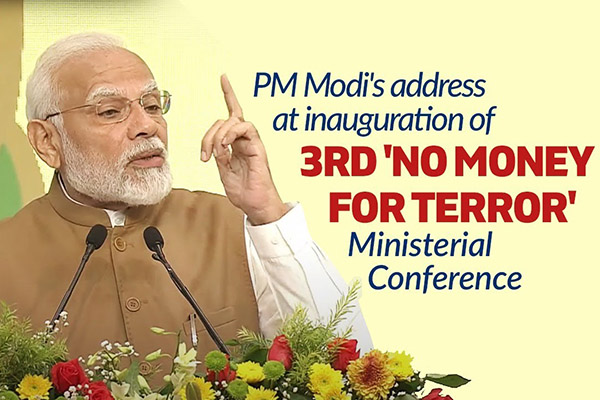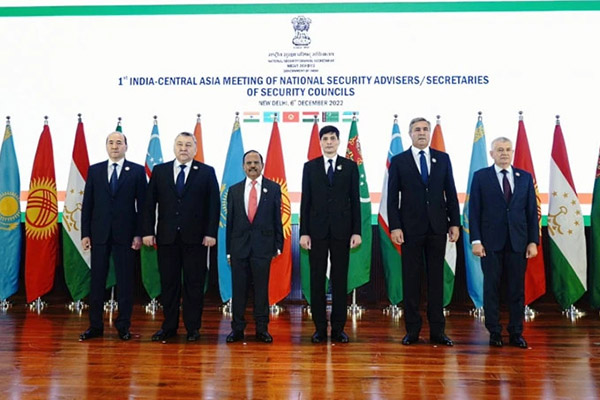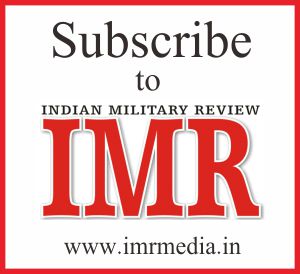India Places High Priority to Counter-Terrorism
India-Central Asia Meeting of NSAs
At the first India-Central Asia meeting of NSAs/secretaries of security councils, involving Kazakhstan, Kyrgyzstan, Tajikistan, Uzbekistan and Turkmenistan, India’s National security adviser (NSA) Ajit Doval, on 6 December, flagged concerns about terror networks in the region, including in Afghanistan, and called for firm steps against terror financing.
The one-day NSA-level meeting was held in the backdrop of the first summit in January 2022 between Prime Minister Narendra Modi and presidents of the five Central Asian countries.
“Afghanistan is an important issue concerning us all. The existence of terrorist networks in the region is also a matter of deep concern. Financing is the lifeblood of terrorism and countering terror financing should be an equal priority for all of us,” Doval said in his inaugural address.


“Central Asia is our extended neighbourhood with which we have civilisational linkages and we accord highest priority to this region. We meet at a time of great churn in international relations and uncertainty about the future. A peaceful, secure and prosperous Central Asia is in our common interest,” Doval said.
There was consensus among the six countries that the expansion of terrorist propaganda, recruitment and fundraising efforts had serious security implications for the region and, a collective and coordinated response was essential.
“The misuse of new and emerging technologies, arms and drug trafficking using terrorist proxies for cross-border terrorism, abuse of cyber space to spread disinformation and unmanned aerial systems present new challenges in counterterrorism efforts and call for collective action,” said a joint communique issued after the meeting.
Top officials of the six countries condemned all “forms and manifestations” of terrorism, and underscored the need to fight the menace collectively. They “discussed the current situation in Afghanistan and its impact on the security and stability of the region, reiterating strong support for a peaceful, stable and secure Afghanistan, emphasising respect for its sovereignty, unity and territorial integrity and urging non-interference in its internal affairs”, the communique said.
The heads of the delegations emphasised that Afghan soil should not be used for sheltering, training, planning or financing any terrorist acts while reaffirming the importance of UNSC Resolution 2593 that no terror outfit should be provided sanctuary or allowed to use that country’s territory. The meeting comes at a time when India and the Central Asian countries celebrating the 30th anniversary of the establishment of their diplomatic relations.
The next NSA-level meeting will be held in Kazakhstan in 2023.
Taliban welcome Initiative
A statement by the “Islamic Emirate of Afghanistan” welcomed the move aimed at building better coordination for the security of the region. It also supported the joint communique issued expressing support for a stable, peaceful, integrated and secure Afghanistan. Afghanistan has reiterated its commitment to not allow its territory to be used for any agency or powers to interfere in other nation’s internal affairs.
US-India Counterterrorism Joint Working Group
Acting Coordinator for Counterterrorism Timothy Betts, a top American counterterrorism official, visited New Delhi for the US-India Counterterrorism Joint Working Group’s annual meeting on 12-13 December 2022 that reviewed regional and global terrorist threat assessments, collaborative bilateral and regional counterterrorism programming, and initiatives to strengthen law enforcement and judicial partnerships.
“No Money for Terror” Conference 2022
The third ‘No Money for Terror’ (NMFT) Ministerial Conference on Counter-Terrorism Financing was held in New Delhi, on 19 November 2022.
The conference was started in 2018, as an initiative of the French government, to specifically focus on cooperation between countries to choke terror funding. In 2019, the conference was held in Australia. It was to be held in India in 2020 but was postponed due to the Covid-19 pandemic.
The conference offered a unique platform for participating nations and organisations to deliberate on the effectiveness of the current international regime on Counter Terrorism Financing and the steps required to address emerging challenges.
It was attended by delegates from 72 countries and 15 international organisations. During the Conference, deliberations were held in four sessions with focus on:
- Global Trends in Terrorism and Terrorist Financing.
- Use of Formal and Informal Channels of Funds for Terrorism.
- Emerging Technologies and Terrorist Financing.
- International Co-operation to Address Challenges in Combating Terrorist Financing.
India’s Stand at NMFT Conference
The Prime Minister of India strongly asked for avoiding any ambiguity in dealing with terrorism and also warned against nations that use terrorism as a tool of foreign policy.
Regime Change in Afghanistan. India urged the international community to take cognisance of threats emerging from regime change in Afghanistan, as the last one had led to 9/11 attacks. The regime changes and the growing influence of Al Qaeda & Islamic State of Iraq and Syria (ISIS) have emerged as a significant challenge to regional security.
Stress on Terrorist’s Safe Havens. India stressed that the international community should never ignore terrorists’ safe havens or their resources.
Threats from Emerging Technologies. Terrorists and terrorist groups understand the nuances of modern weapons and information technology such as Dark Net and Cryptocurrency very well. This transformation of terrorism from dynamite to metaverse and AK-47 to virtual assets is definitely a matter of concern for the countries.
Cost of Terrorism Supportive Countries. Certain countries support terrorism as part of their foreign policy. They offer political, ideological and financial support to them. There must be a cost imposed upon countries that support terrorism. Organisations and individuals that try to create sympathy for terrorists must also be isolated.
Threats from Organised Crime. Organised crime should not be seen in isolation and these gangs often have deep links with terrorist outfits. The money made in gun-running, drugs and smuggling is pumped into terrorism. Even activities like money laundering and financial crimes have been known to help terror funding.
BIMSTEC Joint Working Group on Counter Terrorism
A meeting of the BIMSTEC Joint Working Group on Counter Terrorism and Transnational Crime started was held i New Delhi on 12 January. The meeting was hosted by India and featured participation from Bangladesh, Bhutan, Myanmar, Nepal, Sri Lanka and Thailand. Key issues linked to intelligence sharing, legal and law enforcement, countering radicalisation, terrorism, etc, were discussed.
An MEA statement said the delegates deliberated on different aspects of implementation of the BIMSTEC Convention on Cooperation in Combating International Terrorism, Transnational Organised Crime and Illicit Drug Trafficking, which entered into force on March 16, 2021. India is the lead country for the security pillar under the BIMSTEC framework.
Under the security pillar, the mechanism of BIMSTEC joint working group on counter-terrorism and transnational crime oversees the work of six sub-groups which include:
- Intelligence Sharing
- Legal and Law Enforcement
- Countering Radicalization and Terrorism
- Anti-Money Laundering and Combating the Financing of Terrorism
- Human Trafficking and
- Narcotic Drugs, Psychotropic Substances and Precursor Chemicals
“The meeting discussed traditional and emerging non-traditional security threats in the BIMSTEC region. The participants deliberated and made recommendations on wide ranging issues to enhance cooperation and collaboration in countering terrorism and transnational crimes in the region,” an MEA statement said.



















